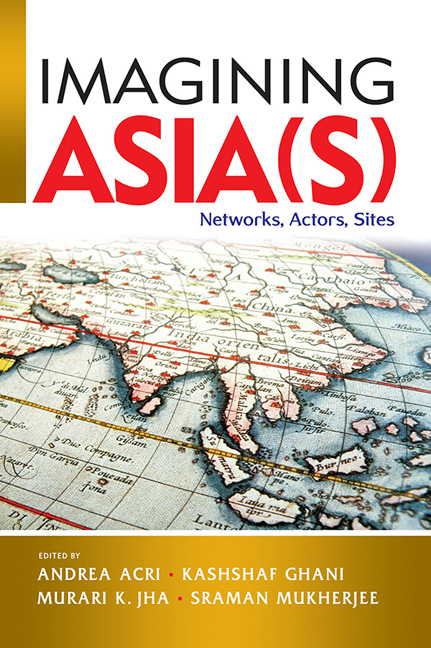Book contents
- Frontmatter
- Contents
- List of Contributors
- Introduction
- Part I Conceptualizing the Region: Past and Present
- 1 Locating Asia, Arresting Asia: Grappling with “The Epistemology that Kills”
- 2 Imagining “Maritime Asia”
- 3 In Search of an Asian Vision: The Asian Relations Conference of 1947
- Part II Conceptualizing Asia through the Prism of Europe
- Part III Networks of Knowledge Across the Indian Ocean
- Part IV Histories and Geographies of Pilgrimage in Asia
- Part V Trans-Local Dynamics and Intra-Asian Connections across Space and Time
- Index
1 - Locating Asia, Arresting Asia: Grappling with “The Epistemology that Kills”
from Part I - Conceptualizing the Region: Past and Present
Published online by Cambridge University Press: 31 January 2020
- Frontmatter
- Contents
- List of Contributors
- Introduction
- Part I Conceptualizing the Region: Past and Present
- 1 Locating Asia, Arresting Asia: Grappling with “The Epistemology that Kills”
- 2 Imagining “Maritime Asia”
- 3 In Search of an Asian Vision: The Asian Relations Conference of 1947
- Part II Conceptualizing Asia through the Prism of Europe
- Part III Networks of Knowledge Across the Indian Ocean
- Part IV Histories and Geographies of Pilgrimage in Asia
- Part V Trans-Local Dynamics and Intra-Asian Connections across Space and Time
- Index
Summary
THE ARRESTING GAZE: ASIA IS FRAMED
Asia reveals itself, over iced coffee.
A few years I ago I found myself walking down Orchard Road in downtown Singapore. I walked past one of those generic coffee bars that serve beverages that purport to have some family resemblance to coffee; and chanced upon two tourists who were sitting outside as they enjoyed their iced caramel lattes. Both were male, Caucasian, and both were uniformly dressed in some kind of “Camel Trophy-Safari” kind of get-up (presumably to blend in with the background, if not each other). Then one of them said to the other: “I believe that here I have found the heart of Asia”.
That Asia can reveal its heart over iced coffee in a high-street urban coffee bar is not surprising, for that is indeed the state of Asia today. Before proceeding any further, I would like to situate this discussion in the context of the here-and-now, which is a modern Asia that exists firmly in the modern era.
In this chapter I wish to raise a problem—one that I have not been able to resolve myself, and one which is itself a symptom of the modern times we live in. That we today are embedded in modernity seems fairly self-evident: Asia's political boundaries today are basically the same boundaries that were drawn in the nineteenth century, when the power of colonial capitalism was at its height. Our nation-states, built as they were on the foundations of colonies of the past (none of which were ever democracies, it could be added) are fundamentally modern constructs in the mould of the Westphalian model. Our epistemologies and vocabularies are likewise modern, replete with references to citizenship, economic agents, assets and commodities, territories, and spaces that are often taken as ontologically set and given. In terms of who and what we are, our sense of identity and what constitutes identities that are Asian are also predicated upon a binary logic where an oppositional form of dialectics is seen to be at work.
- Type
- Chapter
- Information
- Imagining Asia(s)Networks, Actors, Sites, pp. 17 - 35Publisher: ISEAS–Yusof Ishak InstitutePrint publication year: 2019

